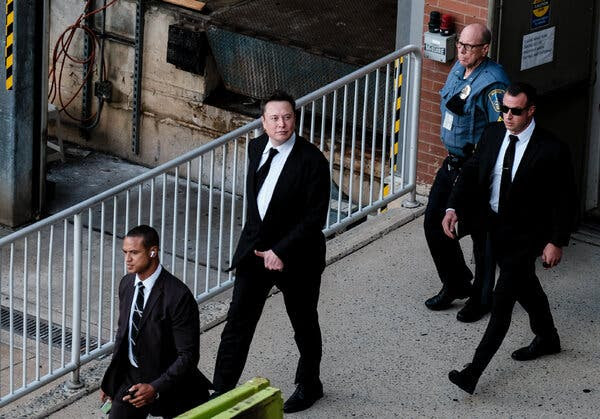Lawmen from each side will meet for the first time on July 19 in a preliminary hearing for an unprecedented legal battle between the world’s richest man and the social network, which is determined to be bought out by its foe.
Twitter launched lawsuits a week ago against the Tesla and SpaceX boss to force him to honor his commitment to acquiring it for $44 billion.
Twitter has been going through an image crisis after months of attacks and denigration from its ex-pendant, Twitter’s part favourite.
“Twitter’s stock has been in good shape” since the filing, noted Wedbush Securities analyst Dan Ives. “It seems that many investors who read it have concluded that this Game of Thrones-style showdown in the courts will end in a victory for Twitter.”
According to the expert, the term “victory” implies a decision by the judge to force Elon Musk to buy the California-based group at a price agreed in late April (USD 54.20 per share) or pay substantial damages.
Elon Musk unilaterally stopped the agreement on July 8 because Twitter’s board of directors had not provided him with reliable information on the number of fake accounts active on the network.
But the chances that Elon Musk will get away with only paying the deal’s termination fee ($1 billion) or be declared in the clear are considered very low.
The dispute is under the jurisdiction of the Delaware Court of Chancery, a court in this small state in the eastern United States, which specializes in business law. Its president, Kathaleen McCormick — the first woman to hold that position — has taken up the case.
“She is a very serious judge who will not be intimidated by either side. (…) In the past, she has not been kind to those who show bad faith,” notes Adam Badawi, a law professor at UC Berkeley.
The platform accused Elon Musk of showing “hypocrisy” and “bad faith” in very harsh words.
Twitter’s lawyers believe he has had a change of heart in the face of recent declines in the stock market valuations of technology companies.
“After putting on a show to make Twitter a target, and after proposing and then signing a merger agreement, Musk seems to believe that he is free — unlike any party bound by contract under Delaware law — to change his mind, defame the company, disrupt its operations, destroy its stock value and wash his hands of it,” they asserted.
Kathaleen McCormick is best known for forcing Kohlberg, a company that had also tried to break off an engagement, to buy the company in question, DecoPac.
The future of Twitter, a social network used worldwide by politicians, celebrities, activists and influencers, seems to have little in common with that of less high-profile organizations.
But “it’s not different enough, I think, for Delaware to risk its reputation by deciding not to enforce the terms of the agreement,” considers Adam Badawi.
The court summons for both parties is expected to address the issue of a potential trial date.
The social networking platform has requested an accelerated procedure from September so as not to prolong the period of uncertainty that partially paralyzes the company.
The opposing party, Elon Musk’s lawyers, filed an appeal on Friday, 15 July, so the hostilities are not opened before next year.
Elon Musk’s lawyers assure that experts will have to analyze “mountains of data” to prove, as the multi-billionaire claims, that the platform is riddled with automated accounts and spam, well beyond the 5% proportion officially indicated.
Kathaleen McCormick, the judge, should also consider the deadlines of the financial package negotiated with banks and investors so as not to compromise the possibility of a buyout.
Elon Musk and the board of directors may still choose to agree on a slightly lower price and thus avoid litigation.
“But that would be rational reasoning,” Adam Badawi points out, referring to the unpredictable nature of Elon Musk, who acts as a “free electron.”
In the past, during another case tried in Delaware, Musk “showed his willingness to go all the way,” adds the professor. “And he won. I don’t think his instinct is necessary to settle.”



Comment here